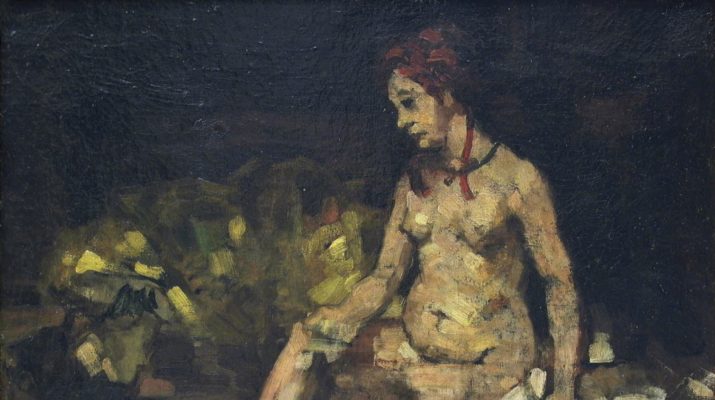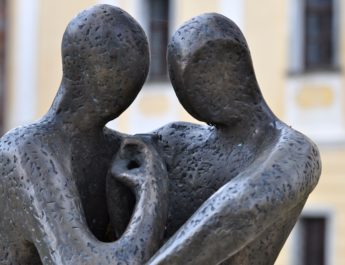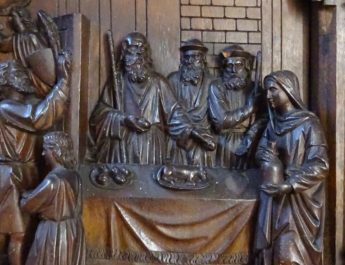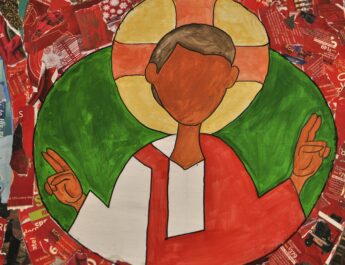2 Samuel 11:1-15
Ordinary B35
BibleHub
1 AIn the springB of the year, the timeC when kingsD go outE to battle,
Notes on verse 1a
A {untranslated} = hayah. This is to be or become, to happen.
B “spring” = teshubah. 8x in OT. From shub (to turn back, return, turn away – literally or figuratively; not necessarily implying going back to where you started from). This is a return, answer, reply. It can also be a time or place that has returned, i.e. the springtime.
C “time” = eth. Probably from anah (to answer, sing, announce); from ad (forever, all, old); from adah (to pass on, advance, decorate oneself). This is a period or season. It can also mean whenever or continually.
D “kings” = melek. From malak (to be or become king or queen, to rise to the throne, to be crowned; by implication, to take counsel). This is king or royal.
E “go out” = yatsa. This is to go or come out, bring forth, appear. It is to go out in a literal or figurative sense.
DavidF sentG JoabH with his officersI and all IsraelJ with him;
Notes on verse 1b
F “David” = David. From the same as dod (beloved, love, uncle); the root may mean to boil, which is used figuratively to describe love. So, this implies someone you love such as a friend, a lover, or a close family member like an uncle. David’s name likely means something like “beloved one.”
G “sent” = shalach. This is to send out, away, send for, forsake. It can also mean to divorce or set a slave free.
H “Joab” = Yoab. Related to {untranslated} in v1. From YHVH (proper name of the God of Israel; God, Lord; the self-existent or eternal one); {from havah (to become) or hayah (see note A above)}. + ab (father, ancestor, grandfather; father in a literal or figurative sense). This is Joab or Yoab, meaning “the Lord is father.”
I “officers” = ebed. From abad (to work, serve, compel; any kind of work; used causatively, can mean to enslave or keep in bondage). This is a servant, slave, or bondservant.
J “Israel” = Yisrael. From sarah (to persist, exert oneself, contend, persevere, wrestle, prevail) + el (God or god). This is Israel, meaning God strives or one who strives with God; new name for Jacob and for his offspring. This refers to the people and to the land.
they ravagedK the Ammonites,L and besiegedM Rabbah.N But David remainedO at Jerusalem.P
Notes on verse 1c
K “ravaged” = shachath. This is to go to ruin, perish, decay, batter, cast off, lose, one who destroys. This can be used in a literal or figurative sense.
L “Ammonites” = ben + Ammon. Literally “children of Ammon.” Ben is from banah (to build or obtain children). This is son, age, child. It is son in a literal or figurative sense. Ammon is from im (with, against, before, beside); {perhaps from amam (to darken, hide, associate; creating shadows by huddling together)} OR from am (people or nation; a tribe, troops or armies, or figuratively to refer to a flock of animals); {from amam (see above)}. This is Ammon or Ammonite. It may mean “a people,” “a great people,” or “inbred.” See https://www.abarim-publications.com/Meaning/Ammon.html
M “besieged” = tsur. This is to confine, cramp, or bind in a literal or figurative sense. It can mean to besiege, assault, or distress.
N “Rabbah” = Rabbah. 15x in OT. From rab (abundance, many, elder, exceedingly, great; abundance of amount, rank, or status); from rabab (increasing in any aspect whether quantity, authority, size, quality, greatness, etc.). This is Rabbah, a place whose name means “great,” “great city,” or “populous.” Seehttps://www.abarim-publications.com/Meaning/Rabbah.html
O “remained” = yashab. This is to sit and so to remain and so to dwell. It is sitting for any reason – as a judge, in order to ambush, or just sitting quietly. Causatively, this can mean settling or marrying. This can also mean continue, endure, or establish.
P “Jerusalem” = Yerushalaim. From yarah (to throw, shoot, be stunned; to flow as water so figuratively to instruct or teach) + shalam (to make amends, to be complete or sound). This is Jerusalem, dwelling of peace.
2 It happened,Q late one afternoon,R when David roseS from his couchT
Notes on verse 2a
Q “happened” = hayah. Same as {untranslated} in v1. See note A above.
R “late one afternoon” = eth + ereb. Literally “in the time of evening.” Eth is the same as “time” in v1. See note C above. Ereb is evening, night, twilight.
S “rose” = qum. To arise, stand, accomplish, establish, abide. This is rising as in rising against, getting up after being sick or asleep, arising from one state to another, becoming powerful, or rising for action. It can also be standing in a figurative sense.
T “couch” = mishkab. From shakab (to lie down, lodge; lying for sleep, sex, or other reasons). This is a place where one lies down i.e. a bed, couch, or bedchamber. It can also be used in an abstract sense to refer to sleep or euphemistically for sex.
and was walkingU about on the roofV of the king’s house,W
Notes on verse 2b
U “walking” = halak. This is go, come, walk. It is walk literally and figuratively and includes people and animals. It can be used figuratively for one’s moral life – how we walk according to God’s way or against it. It can also refer to the walk of life as in the course one’s life takes, the choices we make, etc.
V “roof” = gag. Perhaps from ga’ah (to rise up, increase, grow, be highly exalted; figuratively to be majestic). This is a housetop or other top. It can refer to the surface of an altar.
W “house” = bayit. Related to “Ammonites” in v1. Probably related to banah (see note L above). This is house, court, family, palace, temple.
that he sawX from the roof a womanY bathing;Z the woman was very beautiful.AA
Notes on verse 2c
X “saw” = raah. This is to see in a literal or figurative sense so stare, advise, think, view.
Y “woman” = ishshah. From ish (man); perhaps from enosh (human, humankind, mortal); from anash (to be weak, sick, or frail). This is woman, wife, or female.
Z “bathing” = rachats. This is to wash, wash away – it can be complete or partial.
AA “beautiful” = tob + mareh. Literally “good looking.” Tob is from tob (to be pleasing, to be good). This is good, beautiful, pleasant, agreeable, bountiful, at ease. This word is used for goodness as a concept, a good thing, a good person. This can refer to prosperity and welfare as well as joy, kindness, sweetness, and graciousness. So, this is ethically good, but also enjoyably good. Mareh is related to “saw” in v2. From raah (see note X above). This is sight, appearance, or vision. It can be a view, seeing itself, that which is seen, something real, or a vision one sees.
3 David sent someone to inquireBB about the woman. It was reported, “This is BathshebaCC daughterDD of Eliam,EE
Notes on verse 3a
BB “inquire” = darash. This is seek, ask, inquire, care for. Generally it means following in pursuit or following as part of a search, which implies seeking or asking. Also used specially to mean worship.
CC “Bathsheba” = Bath-sheba. Related to “Ammonites” in v1 & “house” in v2. 11x in OT. From bath (daughter in a literal or figurative sense; can also be branch) {from ben (see note L above)} + perhaps shaba (to swear, curse, vow, make a covenant; properly, to be complete; this is to seven oneself – as in affirming something so strongly it is as though it were said seven times) {perhaps from sheba (seven – the number of perfection/sacred fullness)}. This is Bathsheba, perhaps meaning “daughter of oath.”
DD “daughter” = bath. Related to “Ammonites” in v1 & “house” in v2 & “Bathsheba” in v3. See note CC above.
EE “Eliam” = Eliam. Related to “Israel” and “Ammonites” in v1. 2x in OT. From el (see note J above) + am (see note L above). This is Eliam, a name meaning “God is kinsman,” “God of the people,” or “God’s people.” See https://www.abarim-publications.com/Meaning/Eliam.html
the wifeFF of UriahGG the Hittite.”HH
Notes on verse 3b
FF “wife” = ishshah. Same as “woman” in v2. See note Y above.
GG “Uriah” = Uriyah. Related to {untranslated} and “Joab” in v1. From ur (fire, light, the east); {from or (to be or become light, shine)} + Yah (the shortened form of the name of the God of Israel; God, Lord); {from YHVH (see note H above)}. This is Uriah or Urijah, a name meaning “flame of the Lord,” “the Lord is light,” “light of the Lord.” See https://www.abarim-publications.com/Meaning/Uriah.html
HH “Hittite” = Chitti. From cheth (Heth or Cheth; one of Canaan’s sons from whom perhaps the Hittites descend) OR from hatat (terror, lacking strength or courage); perhaps from hata (to seize; often used of coals from a fire). This is Hittite – perhaps meaning terrors or terrible. Seehttps://www.abarim-publications.com/Meaning/Hittite.html#.XyMgpp5KhPY
4 So David sent messengersII to getJJ her, and she cameKK to him, and he layLL with her.
Notes on verse 4a
II “messengers” = malak. This is a messenger, an angel, or a deputy of some kind. Can be used for human messengers literally or for prophets, priests, or teachers as messengers of God. Also used for supernatural messengers i.e. angels.
JJ “get” = laqach. This is to take, accept, carry away, receive. It can also have the sense of take a wife or take in marriage.
KK “came” = bo. This is to enter, come in, advance, fulfill, bring offerings, enter to worship, attack. It can also have a sexual connotation.
LL “lay” = shakab. Related to “couch” in v2. See note T above.
(Now she was purifyingMM herself after her period.)NN Then she returnedOO to her house.
5 The woman conceived;PP and she sent and toldQQ David, “I am pregnant.”RR
Notes on verses 4b-5
MM “purifying” = qadash. From qodesh (set apart and so sacred; God is different from us and so God is holy/set apart; things we dedicate to God’s service are set apart for God and so they, too, are holy). This is set apart, consecrated, hallowed, sanctified. This is something or someone that is set apart for a holy purpose or use – ceremonially or morally clean.
NN “period” = tum’ah. From tame (becoming unclean, foul, defiled; polluted, particularly in a ritual or moral sense). This is filthiness or uncleanness. It can refer to ritual or moral impurity.
OO “returned” = shub. Related to “spring” in v1. See note B above.
PP “conceived” = harah. This is to conceive or be pregnant – it can be literal or figurative.
QQ “told” = nagad. This is to declare, make conspicuous, stand in front, manifest, predict, explain.
RR “pregnant” = harah. Related to “conceived” in v5. 16x in OT. From harah (see note PP above). This is a pregnant woman.
6 So David sent word to Joab, “Send me Uriah the Hittite.” And Joab sent Uriah to David. 7 When Uriah came to him, David askedSS how Joab and the people fared,TT and how the warUU was going.VV
Notes on verses 6-7
SS “asked” = shaal. This is to ask, inquire, beg, borrow, desire, request. It can also mean to demand.
TT “fared” = shalom. Related to “Jerusalem” in v1. From shalam (see note P above). This is completeness, soundness, welfare, favor, friend, good health. It is to be safe and figuratively well, happy, at peace, friendly. Abstractly, it includes the ideas of welfare and prosperity (not in excessive wealth, but in having enough).
UU “war” = milchamah. From lacham (to eat or feed on; figuratively, to battle as a kind of consumption/destruction). This is battle, war, fighting, or one who fights (i.e. a warrior).
VV “was going” = shalom. Same as “fared” in v7. See note TT above.
8 Then David said to Uriah, “Go downWW to your house, and washXX your feet.”YY Uriah went out of the king’s house, and there followedZZ him a presentAAA from the king.
Notes on verse 8
WW “go down” = yarad. This is to go down, descend; going down in a literal or figurative sense. It can be going to the shore or a boundary, bringing down an enemy.
XX “wash” = rachats. Same as “bathing” in v2. See note Z above.
YY “feet” = regel. This is foot, endurance, or journey. It is a foot as the means of walking and so it implies a step or a greater journey. It can be used euphemistically for private parts.
ZZ “followed” = yatsa + achar. Literally “went out after.” Yatsa is the same as “go out” in v1. See note E above.
AAA “present” = maseth. 16x in OT. From nasa (to lift in a broad sense, literally and figuratively; to carry, take, or arise; to bring forth, advance, accept). This is an utterance, lifting up, collection, uprising, a rising flame or beacon, a present lifted up, a mess, reproach, or burden.
9 But Uriah sleptBBB at the entranceCCC of the king’s house with all the servantsDDD of his lord,EEE and did not go down to his house.
10 When they told David, “Uriah did not go down to his house,”
David said to Uriah, “You have just come from a journey.FFF Why did you not go down to your house?”
Notes on verses 9-10
BBB “slept” = shakab. Same as “lay” in v4. See note LL above.
CCC “entrance” = pethach. From pathach (to open wide in a literal or figurative sense; to open, draw out, let something go free, break forth, to plow, engrave, or carve). This is any kind of opening – a door, entrance, gate.
DDD “servants” = ebed. Same as “officers” in v1. See note I above.
EEE “lord” = adon. From a root that means ruling or being sovereign. This is lord, master, or owner.
FFF “journey” = derek. From darak (to tread, march, to walk. Can also mean affixing a string to a box since one needs to step on it to bend it in the process; so also an archer). This is a road as a thing that is walked on. Can be used figuratively for the path that one’s life takes or how one chooses to live one’s life.
11 Uriah said to David, “The arkGGG and Israel and JudahHHH remain in booths;III and my lord Joab and the servants of my lord are campingJJJ in the openKKK field;LLL
Notes on verse 11a
GGG “ark” = aron. Perhaps from arah (to gather or pluck). This is a chest, box, or coffin. It is used for the Ark of the Covenant.
HHH “Judah” = Yehudah. Probably from yadah (to throw one’s hands into the air in a gesture of praise); from yad (hand). This is Judah, meaning “praised.”
III “booths” = sukkah. From sok (lair, thicket, den, or hiding place; a den or pavilion as made of intertwined boughs); from sakak (to interweave, knit). This is a booth, canopy, shelter, tent, or tabernacle. This is also the “sukkah” from the Jewish holiday “sukkot,” which remembers the wilderness wanderings.
JJJ “camping” = chanah. This is decline, bending down, or living in tents. It can be camping to create a home or camping as a part of battle.
KKK “open” = paneh. From panah (to turn, face, appear). This is face in a literal or figurative sense. It could be face, presence, anger, respect. It can also be used of God to indicate divine favor or presence.
LLL “field” = sadeh. This is literally field, ground, soil, or land. It can be used to mean wild like a wild animal.
shall I then go to my house, to eatMMM and to drink,NNN and to lie with my wife? As you live,OOO and as your soulPPP lives, I will not doQQQ such a thing.”RRR
Notes on verse 11b
MMM “eat” = akal. This is to eat, devour, burn up, or otherwise consume. It can be eating in a literal or figurative sense.
NNN “drink” = shathah. This is to drink literally or figuratively. It could also be a drinker.
OOO “live” = chay. From chayah (to live or keep alive literally or figuratively). This is alive, living, lifetime. It can also be used to describe someone’s age. It can refer to animals, plants, water, or a company or congregation of people. It is life in a very broad sense.
PPP “soul” = nephesh. Related to naphash (to refresh or be refreshed). This is soul, self, person, emotion. It is a breathing creature. Can also refer to appetites and desires.
QQQ “do” = asah. This is to make, do, act, appoint, become in many senses.
RRR “thing” = dabar. From dabar (to speak, declare, discuss). This is speech, a word, a matter, an affair, charge, command, message, promise, purpose, report, request. It is a word, which implies things that are spoken of in a wide sense.
12 Then David said to Uriah, “Remain here today also, and tomorrowSSS I will send you back.” So Uriah remained in Jerusalem that day. On the nextTTT day, 13 David invitedUUU him to eat and drink in his presenceVVV and made him drunk;WWW and in the eveningXXX he went out to lie on his couch with the servants of his lord, but he did not go down to his house.
Notes on verses 12-13
SSS “tomorrow” = machar. Perhaps from achar (to be behind, delay, be late, procrastinate, continue). This is tomorrow or later. It is some kind of deferred time, so it could also mean indefinitely or refer to the time to come.
TTT “next” = mochorath. Related to “tomorrow” in v12. From the same as machar (see note SSS above). This is the next day or next.
UUU “invited” = qara. This is to call or call out – to call someone by name. Also used more broadly for calling forth.
VVV “presence” = paneh. Same as “open” in v11. See note KKK above.
WWW “made…drunk” = shakar. 19x in OT. This is to be filled with drink, merry, tipsy. It can be satiated in a positive sense or drunken in a negative sense. It can also figuratively refer to influence.
XXX “evening” = ereb. Same as “afternoon” in v2. See note R above.
14 YYYIn the morningZZZ David wrote a letterAAAA to Joab, and sent it by the handBBBB of Uriah.
Notes on verse 14
YYY {untranslated} = hayah. Same as {untranslated} in v1. See note A above.
ZZZ “morning” = boqer. From baqar (to seek, plow, break forth, admire, care for). This refers to the break of day. So it is dawn, early, morning, or morrow.
AAAA “letter” = sepher. Perhaps from saphar (to tally or record something; to enumerate, recount, number, celebrate, or declare). This is can be writing itself or something that is written like a document, book, letter, evidence, bill, scroll, or register.
BBBB “hand” = yad. This is hand, ability, power. Hand in a literal sense, but also what one can do or the means by which one does it.
15 In the letter he wrote, “SetCCCC Uriah in the forefrontDDDD of the hardestEEEE fighting,FFFF
Notes on verse 15a
CCCC “set” = yahab. This is give, put, bring, take. It is to give in a literal or figurative sense.
DDDD “forefront” = mul + paneh. Mul is perhaps from mul (to cut off, cut in pieces, or destroy; to circumcise, to blunt). This is front, opposite, abrupt, prepuce. Paneh is the same as “open” in v11. See note KKK above.
EEEE “hardest” = chazaq. From chazaq (to strengthen, seize, be courageous, repair, bind, heal, conquer, harden). This is strong, hard, powerful, loud, bold, violent, impudent. It is usually strong in a negative sense.
FFFF “fighting” = milchamah. Same as “war” in v7. See note UU above.
and then draw backGGGG from him, so that he may be struck downHHHH and die.”IIII
Notes on verse 15b
GGGG “draw back” = shub. Same as “returned” in v4. See note OO above.
HHHH “struck down” = nakah. This is to hit whether lightly or severely. It can be used in a literal or figurative sense. So, this could be beat, punish, give wounds, kill, or slaughter.
IIII “die” = mut. This is to die in a literal or figurative sense. It can also refer to being a dead body.
Image credit: “Bathsheba, after Rembrandt” by Paul Cézanne, circa 1870.




